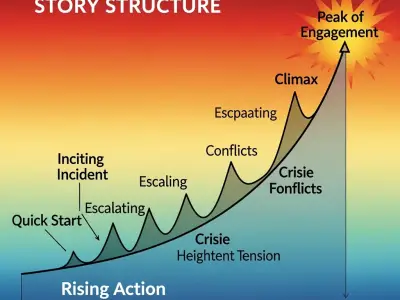Journaling is a simple yet deeply impactful practice that can enhance various aspects of your life, from improving mental health to fostering creativity. Many influential people throughout time detailed their lives in journals - the struggles, the joys, the steps taken to reach their dreams. In the end, journals can tell life stories, help us understand breakthrough moments in the creative process, change habitual patterns, and track goals.
Here, we explore these advantages, followed by a Q&A section to address common queries about starting and maintaining a journaling habit.
Jump to:
What Are the Benefits of Daily Journaling?
A daily journaling practice can do wonders for your mental health. Here are eight benefits of putting pen to paper:
Recommended for you!
Best Sellers1. Enhances Self-Awareness
Journaling acts as a mirror, reflecting your inner world. It helps you understand your thoughts, emotions, and behaviours, leading to greater self-awareness and personal growth.
2. Reduces Stress and Anxiety
Writing down your worries and fears is a therapeutic way to release pent-up emotions. Journaling can serve as a safe space to explore and manage feelings of anxiety and stress.
3. Improves Memory and Comprehension
Regularly jotting down thoughts and experiences can sharpen your memory and comprehension skills. It's a mental workout that keeps the brain engaged and active.
4. Boosts Mood and Emotional Well-Being
Expressing yourself through writing can have a cathartic effect, improving your mood and overall well-being. It's an effective way to navigate complex emotions.
5. Enhances Communication Skills
Journaling helps you articulate thoughts clearly and concisely, translating into improved verbal and written communication skills.
6. Fosters Creativity
The free-flowing nature of journaling can unlock creative potential, helping you brainstorm ideas and explore new concepts without judgment or restraint.
7. Strengthens Decision-Making Abilities
Reflecting on past experiences and current challenges through journaling can enhance your decision-making skills, allowing you to see situations from multiple perspectives.
8. Tracks Progress and Growth
Journaling serves as a personal record of your journey, enabling you to track progress, celebrate achievements, and reflect on your growth.

Is Journaling and Diary Writing the Same?
Journaling and diary writing, while similar, serve different purposes. A diary is primarily used for recording daily events and personal experiences, often focusing on the writer's activities, encounters, and feelings about everyday life. It's a chronological log, offering a detailed account of each day.
On the other hand, journaling extends beyond daily recaps. It encompasses not only reflections on daily events but also includes broader insights, ideas, and thoughts. Journaling can be more thematic, exploring specific topics like gratitude, goals, or personal growth. It's a versatile tool used for self-reflection, creative expression, and problem-solving, going beyond the scope of a traditional diary's daily documentation.
How to Journal Effectively: 5 Journaling Methods
Journaling can be used in various ways, depending on your goals. Using a journal is helpful whether you are an artist brainstorming your next project or a busy schoolteacher who needs to let off some steam! The purpose of journal therapy is to focus on internal experiences rather than to repress or ignore them. Here are five effective methods of journaling:
1. Journaling for Healing
Journaling for healing benefits anyone recovering from physical or mental health troubles. It’s a helpful method for people going through cancer treatment to handle the tough aspects of serious illness and recovery. It's also good for dealing with depression and anxiety, as it allows a safe space to work through tough feelings. Research shows that writing in a journal for 15 minutes, three to five times a week, can improve the mood of those dealing with mental health issues.
2. Journaling for Stress Relief
Writing down your thoughts and feelings, especially those related to stressful experiences, provides a safe, private space to express and process emotions that might otherwise remain bottled up. When you journal, you allow yourself to explore and release the tensions and worries occupying your mind, which can be incredibly therapeutic. It’s a simple yet effective way to manage stress, improve mental well-being, and maintain emotional balance in your daily life.

3. Dream Journaling
If you want to learn more about your dreams and subconscious, then starting a dream journal is the way to go. This fascinating daily practice works by recording your dreams immediately upon waking when they are fresh in your mind. Through this practice, you will notice reoccurring themes that can provide fascinating insight into your subconscious mind.
4. Creative Journaling
For the creative types, journaling is more than just recounting memories. It is a way to let ideas out and is often one of the first steps in a project. Building structure into a creative process helps artists to problem-solve, organise, and unravel their thoughts. In the creative process, journal therapy helps break down complex ideas so that small steps can be made towards a larger project.
5. Journaling for Your Career
Journaling for your career involves regularly writing down your professional experiences, goals, challenges, and achievements. By documenting your experiences, you gain valuable insights into your strengths, areas for improvement, and the patterns in your professional behaviour. This reflection can lead to more strategic decision-making and enhanced problem-solving skills. Additionally, journaling about your career can boost motivation and job satisfaction, as it allows you to celebrate successes and learn from setbacks, keeping you engaged and focused on your career path. It's a simple yet powerful tool for personal and professional growth, helping you navigate your career journey more clearly and purposefully.
Does Journaling Help with Anxiety?
Journaling can be a helpful tool in managing anxiety. It lets you clarify your thoughts and feelings, putting worries into perspective. By expressing your fears on paper, you can often find your fears more manageable by expressing them on paper.
How to Start Journaling for Mental Health
To begin journaling for mental health, set a regular time and place for writing. Focus on expressing your feelings and thoughts honestly without worrying about grammar or style. Use prompts if you need help figuring out where to start, such as writing about what you're grateful for or how you felt during the day.
Recommended for you!
Best Sellers30 Journal Prompts to Help You Get Started
Your journaling journey can be a transformative experience, offering insights into thoughts and emotions. However, knowing where to start can sometimes be the hardest part. To help you begin, here are 30 thought-provoking journal prompts designed to spark reflection, creativity, and self-discovery:
- What am I grateful for today?
- How have I grown in the past year?
- What are my top three goals right now, and why?
- What is a challenge I recently overcame?
- What are my strengths, and how can I use them more?
- What is my happiest memory, and why does it stand out?
- What qualities do I admire in others and why?
- How do I practice self-care, and what can I improve?
- What was a recent mistake, and what did I learn from it?
- What am I most passionate about, and why?
- How do I handle stress, and what strategies can I try?
- What does my ideal day look like, and why?
- What am I afraid of, and how can I face these fears?
- What are my core values, and how do they guide me?
- Who has influenced my life positively, and how?
- What makes me unique, and how do I celebrate it?
- What is a book that changed my perspective, and how?
- What are the biggest lessons I’ve learned in life?
- How do I express love, and how do I like to receive it?
- What does success mean to me, and why?
- What are my coping mechanisms for tough days?
- What does happiness mean to me, and how do I find it?
- What are my biggest fears about the future?
- How do I feel about my career path, and why?
- What have I been procrastinating on, and why?
- What does forgiveness mean to me, and who do I need to forgive?
- What brings me peace, and how do I cultivate it?
- How do I want to be remembered, and why?
- What is something new I want to learn or try?
- How do I envision my life in five years?

Study Journal Therapy for £29
Journaling is a powerful, accessible tool that offers greater self-awareness, emotional well-being, and personal growth. To deepen your understanding and skills in journaling, why not explore further with our Journal Therapy Diploma Course? This comprehensive course is designed to guide you through the nuances of journaling, helping you harness its full potential for your mental health and personal development.
For a limited time, we're offering this course at a special discounted price of only £29. Embark on this enlightening journey with us and transform your life, one page at a time. Follow the link above to enrol and begin your transformative journey with journaling today!












